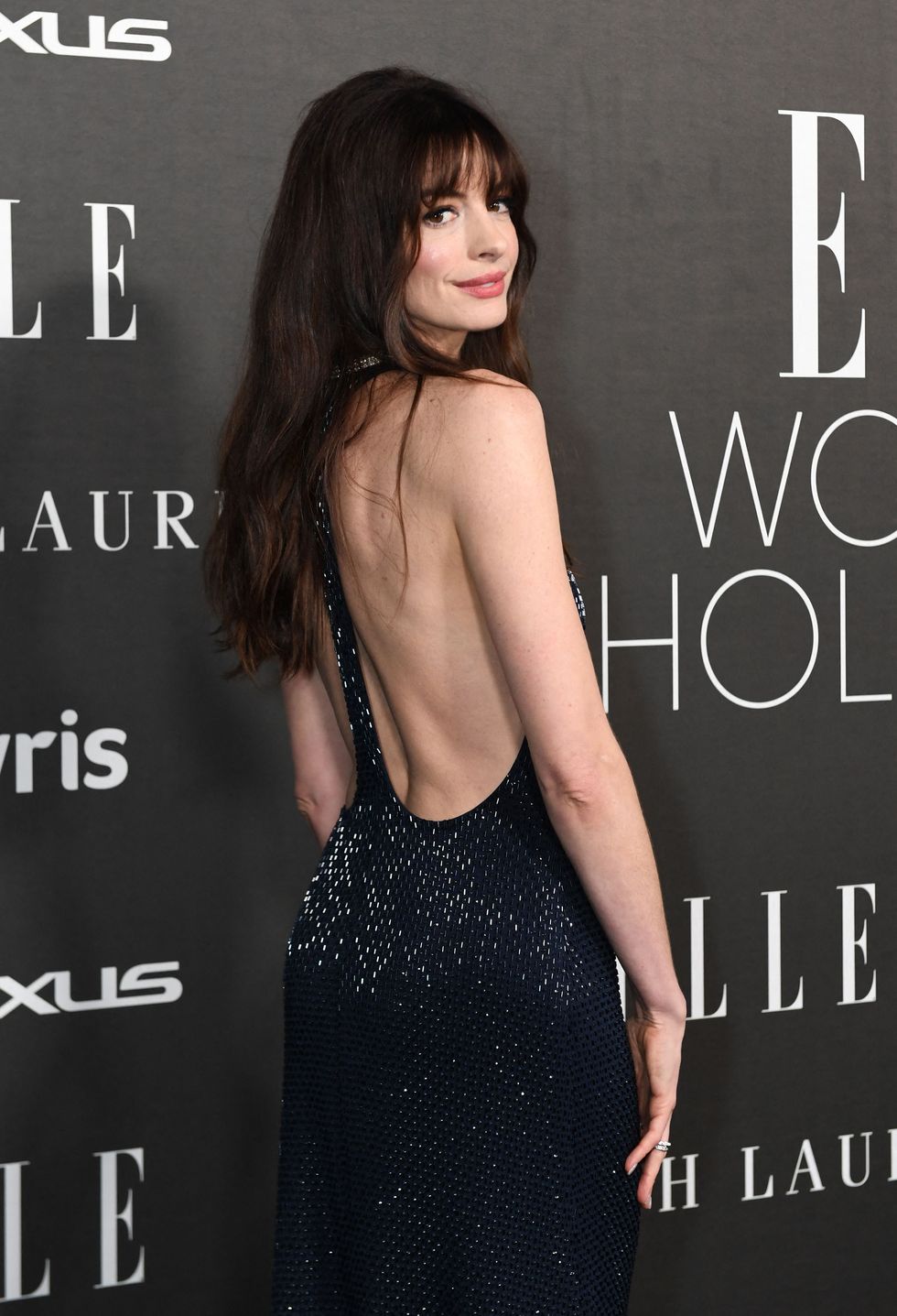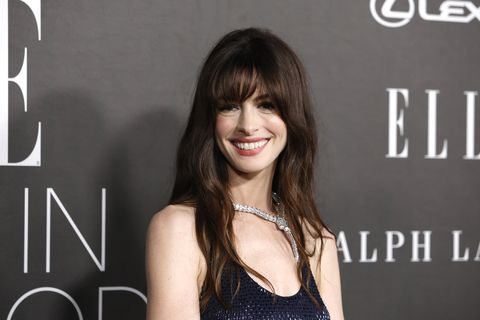Anne Hathaway Addresses ‘Hathahate’ and Her Self-Love Journey, 10 Years Later
During her acceptance speech at ELLE’s 29th annual Women in Hollywood event on Tuesday, Armageddon Time actress Anne Hathaway gracefully addressed the infamous era known as Peak “Hathahate.” If you managed to evade that particular corner of online discourse a decade ago, a quick recap: The year was 2013, Hathaway had just won an Oscar for Les Misérables, and the vitriolic noise around the actress’s so-called “annoying” earnestness had grown so loud that both the New Yorker and the New York Times had hopped on the case.
She was too pretty. Too perfect. Too painted-on. Too happy. Too transparent in her try-hard efforts to be adored. As Sarah Nicole Prickett, a writer, told the Times nearly a decade ago, “It’s not really Anne Hathaway I ‘hate.’ It’s all the lesser, real-life Anne Hathaways I have known—princessy, theater-schooled girls who have no game and no sex appeal and eat raisins for dessert.”
In other words, Hathaway became a punching bag for a certain brand of internet sexism couched in the language of cool cynicism. In the nearly 10 years since #hathahaters trended on social media, Hathaway has seemed to make peace with the (almost entirely unfounded) attacks, telling Jezebel in 2017, “I am…not eager, but I am ready for the conversation to move to a place beyond it.”
More From ELLE

For her Women in Hollywood cover interview with ELLE, Hathaway briefly touched on her self-love journey, saying, “I do my best to not be afraid of what others might say and just focus on enjoying my life.” But during the WIH event honoring this year’s nominees, Hathaway addressed the controversy head-on.
“Ten years ago, I was given an opportunity to look at the language of hatred from a new perspective,” she told an audience of her peers at the Getty Center in Los Angeles. “When your self-inflicted pain is suddenly somehow amplified back at you at, say, the full volume of the internet… It’s a thing.”
She later added, “When what happened, happened, I realized I had no desire to have anything to do with this line of energy. On any level. I would no longer create art from this place. I would no longer hold space for it, live in fear of it, nor speak its language for any reason. To anyone. Including myself… Hate seems to me to be the opposite of life; in soil that harsh, nothing can grow properly, if at all.”
Read the full transcript of Hathaway’s inspiring speech below, touching not only on the legacy of Hathahate but the future she hopes to build for her children.
“I am so proud to be one of eight this evening. If it’s okay, I want to mention a few things that have been on my mind.
First, I’m very happy for Sydney Sweeney. That is a phenomenal way to be in your 20s. Congratulations.
I am also happy for Olivia Wilde on her stunning transition into directing; Zoë Kravitz for achieving icon status; Michelle Yeoh for her Oscar nomination—oh, wait, that hasn’t happened yet. Well, until it does—on being a higher being among us. For Sigourney Weaver: for your eternal epicness. For Ariana DeBose: for doing the thing as herself. I am so happy for Issa Rae. I am so happy that you talked into that mirror and have taken it all the way to mogul status. I am so, so happy and grateful to Nina Garcia for organizing this night of celebration and culture and for including me in it.
Second, I want to say: Be happy for women. Period. Especially be happy for high-achieving women. Like, it’s not that hard.
The other thing I wanted to quickly say is, in my opinion, that the language of hatred begins with the self. Thank you for letting me go there. I felt it was important to bring this concept up because I recently overheard a little girl, like age 8 to 11, telling her mother in a parking lot that her friend—who I assume is also a little girl—hated her own mouth. And I really felt for that young, young little girl experiencing the first flush self-hatred. which is something I’m sure a lot of us understand. And we don’t have enough time to discuss all the myriad causes of the violent language of hatred, and the imperative need to end it.
I would like to speak a bit about what it took to end it in myself.
Ten years ago, I was given an opportunity to look at the language of hatred from a new perspective. For context—this was a language I had employed with myself since I was 7. And when your self-inflicted pain is suddenly somehow amplified back at you at, say, the full volume of the internet… It’s a thing.
When it happened to me, I realized that this wasn’t it. This wasn’t the spot. When what happened, happened, I realized I had no desire to have anything to do with this line of energy. On any level. I would no longer create art from this place. I would no longer hold space for it, live in fear of it, nor speak its language for any reason. To anyone. Including myself.
Because there is a difference between existence and behavior. You can judge behavior. You can forgive behavior or not. But you do not have the right to judge—and especially not hate—someone for existing. And if you do, you’re not where it’s at.
Hate seems to me to be the opposite of life; in soil that harsh, nothing can grow properly, if at all.
And I feel this is what we are talking about when we talk about culture. We are essentially talking about the soil that our collective and personal roots take hold in. And as the mother of young children—which means someone who has spent the last six years around young children—I am of the firm belief that we are born experiencing love. And then we form, in a culture of misplaced hate, unhealed hurt, and the toxicity that is the byproduct of both.
This next point is debatable, and I hope it is not offensive in its optimism, but: I believe the good news about hate being learned is that whoever learned it can learn. There is a brain there. I hope they give themselves a chance to relearn love.
To that little girl—to all young people, actually—I wish I could tell you the world is in a good place. I wish I could tell you we are doing a good job balancing capitalism and environmental preservation and we’ll be safe no matter what. I wish I could tell you that you will be safe in your freedom, that your freedom is ensured, that you will live untouched by inequality, bias, hate, and autocracy.
I wish I could tell you that, when the assault enthusiast in chief bragged about what fame would let him do to a woman’s body, we were all wise enough to see that an assault on a person could very well lead to an assault on democracy and on our Capitol. I wish I could tell you that. But for some horrific reason, I cannot. I’m sorry.
What I can tell you is that Issa Rae, Olivia Wilde, Zoë Kravitz, Michelle Yeoh, Sydney Sweeney, Sigourney Weaver, Mindy Kaling, Nina Garcia, myself, alongside innumerable women and men in Hollywood and beyond are working really, really, really hard to make a better culture. Not everybody, but a lot of people. And we would give anything for the work to be done by the time you grow up. But, honestly, it likely won’t be. So, little one, we’re gonna need you. Even if you don’t go into Hollywood, we need people who have learned to reject the hate prevalent in all facets of our society by contributing to a culture of love, starting with themselves.
To that little girl I heard about in the parking lot: Please, darling, don’t hate your mouth. For, inshallah, it will kiss the love of your life; it will speak your most brilliant thought; it will release your righteous anger; it will forgive; it will sing; it will scream with joy; it will gasp in ecstatic wonder. And, if you are lucky, it will taste the soil of our precious earth in a moment of electric gratitude.
Please, darling, don’t hate your mouth. Love your life.”
Lauren Puckett-Pope is an associate editor at ELLE, where she covers film, TV, books and fashion.


